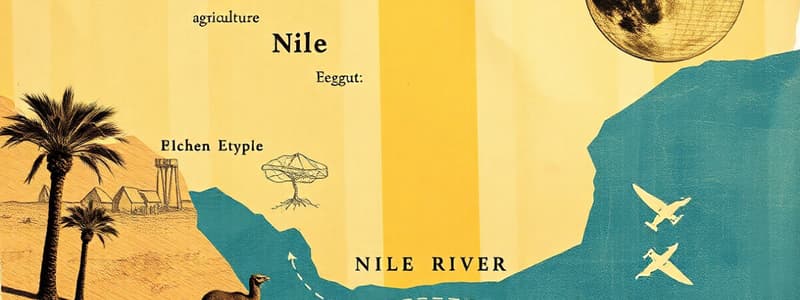Podcast
Questions and Answers
What is the length of the Nile River?
What is the length of the Nile River?
- 5,500 km
- 6,650 km (correct)
- 7,000 km
- 6,450 km
The 'Black Land' refers to the desert areas in ancient Egypt.
The 'Black Land' refers to the desert areas in ancient Egypt.
False (B)
What tool did Egyptians invent to help irrigate their land?
What tool did Egyptians invent to help irrigate their land?
shaduf
The farmland in ancient Egypt was limited to areas directly beside the __________.
The farmland in ancient Egypt was limited to areas directly beside the __________.
Match the following terms with their descriptions:
Match the following terms with their descriptions:
What major benefit did the Nile River provide to farmers in ancient Egypt?
What major benefit did the Nile River provide to farmers in ancient Egypt?
Farmers in ancient Egypt lived in large, expansive fields far from the Nile River.
Farmers in ancient Egypt lived in large, expansive fields far from the Nile River.
How did the flooding of the Nile River support agriculture?
How did the flooding of the Nile River support agriculture?
The __________ of the Nile River allowed Egyptians to transport food and fish easily.
The __________ of the Nile River allowed Egyptians to transport food and fish easily.
Flashcards
Nile River
Nile River
The longest river in the world, crucial for Ancient Egypt's life.
Red Land
Red Land
The desert land in Ancient Egypt, less fertile.
Black Land
Black Land
Fertile land beside the Nile River in Ancient Egypt.
Irrigation
Irrigation
Signup and view all the flashcards
Shaduf
Shaduf
Signup and view all the flashcards
Farming Expansion
Farming Expansion
Signup and view all the flashcards
Transportation Network
Transportation Network
Signup and view all the flashcards
Summer Flooding
Summer Flooding
Signup and view all the flashcards
Limited Farmland
Limited Farmland
Signup and view all the flashcards
Study Notes
Ancient Egypt Geography
- Ancient Egypt was located along the Nile River, which is the longest river in the world at 6,650 km.
- People lived on either Red Land (desert) or Black Land (fertile land next to the river).
- Farmers' plots were located in long, narrow strips next to the river, allowing access to water.
- The Nile River supported life by irrigating farmland, providing transportation routes, and bringing fish.
- Summer flooding provided fertile land.
Agricultural Technology
- Farmland was limited to areas beside the Nile due to dry, non-fertile land.
- A need for more farmland prompted invention of the shaduf (bucket and lever).
- The shaduf allowed people to scoop water to dry areas, expanding farmland.
- This tool made life easier for the Egyptians.
City Location
- Careful consideration of city location is important as it impacts water access and resource availability
- Egyptians built cities near the Nile River due to its benefits as a source of water.
Studying That Suits You
Use AI to generate personalized quizzes and flashcards to suit your learning preferences.




